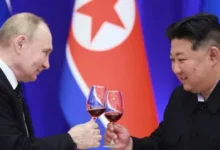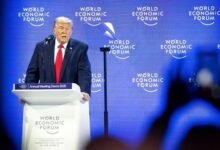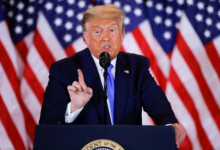Hong Kong security law: Carrie Lam dismisses concerns over rights
Hong Kong’s leader, Carrie Lam, has said other countries “have no place” interfering in the territory, as she robustly defended a controversial national security law planned by China.
The law would ban treason, secession, sedition and subversion. Critics say it would limit the city’s freedoms.
But in her weekly press conference, Ms Lam said it was a “responsible” move to protect the law-abiding majority.
She denied that the law would curtail the rights of Hong Kongers.
These rights – set out in the Basic Law which is Hong Kong’s mini-constitution – have been in place since it was handed back to China in 1997 by the UK. The Basic Law guarantees certain freedoms to the territory, such as the right to protest, which do not exist on the mainland.
At the weekend, there was a brief return to the protests seen last year, with police firing tear gas as thousands of people took to the streets.
It is not actually a law yet but a proposal – being called a “draft decision” – that will be put to a vote at China’s rubber-stamp parliament, the National People’s Congress (NPC), this week.
Once that vote is passed, the proposal will be fleshed out into a draft law and could be in force by the end of June.
Ever since it was announced, it has faced fierce criticism internationally, but Ms Lam said other countries had “no place in interfering with this arrangement”.
No country would tolerate flawed national security legislation, she said, and Hong Kong, as part of China, was no different.
Opponents say the proposed law is a direct attempt to curtail the city’s unique freedoms.
Ms Lam repeatedly said there had been no detail yet, but that the text of China’s “draft decision” should reassure the public.
She also spoke of the “positive response” from the public in the past few days, saying it “flies in the face of what those overseas politicians are saying”.
The bill would target “a handful of people” involved in terrorism or subversion, she said, and anyone worried about it should wait for the full details to be released.
Hong Kong’s freedoms, vibrancy and core values “will continue to be there”, she said, but added: “Rights and freedoms are not absolute.”
The law would enhance Hong Kong’s status as a global financial centre, rather than damage it, she said, calling those fears “totally groundless”.
There is also concern that the law could allow China to install its own law enforcement agencies in Hong Kong, alongside the city’s own.
-BBC







